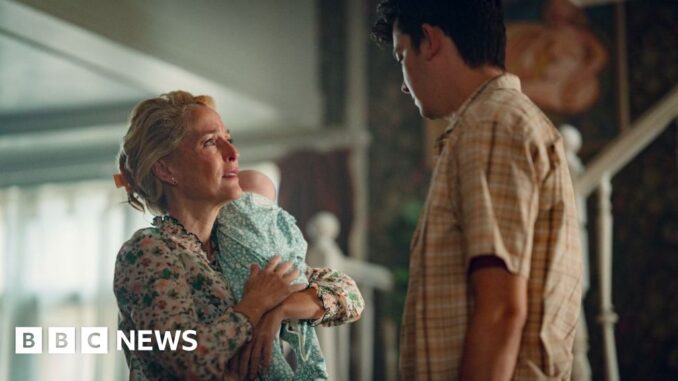
Gillian Anderson tells me she is “very comfortable” talking about sex. The clues were obvious even before we met to talk about her new book, Want, a collection of women’s sexual fantasies.
The actor – once deemed the sexiest woman in the world by FHM magazine – wore a dress covered in vulvas to an awards ceremony and has a soft drinks brand called the G Spot.
She’ll forever be associated with frank discussions about intimate activities, after her role as a sex therapist in the hit Netflix show Sex Education.
But Anderson says even she “struggled” to express her own sexual fantasy in words for the book, as requested by her publishers.
“Suddenly describing the imagery that’s been in my head for a while and the action of doing that, added a level of intimacy that I wouldn’t have expected, and I wouldn’t have expected myself to be so shy around it.”
Anderson’s fantasy is hidden amongst 174 in a book she curated that is not for the prudish.
The actor, who first made her mark as Dana Scully in the TV show The X Files, and her publishers received 1,800 anonymous submissions from women around the world.
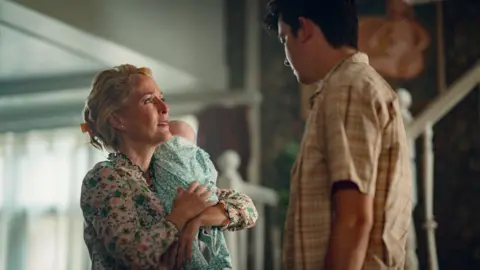 Netflix
NetflixThe letters were whittled down and collated into 13 chapters with titles including “To Be Worshipped”, “Exploration”, “Power and Submission” and “The Watchers and the Watched”.
The contributors were self-selecting and anonymous detailing only sexual identity, age, income, relationship status.
Clinical psychologist Professor Susan Young, who’s read the book, tells me “sexual fantasies are a healthy and normal aspect of sexual expression, provided they do not cause distress and harm”.
They allow people to explore “in a safe, private and controlled environment – their minds”.
Some of the fantasies in Want are moving – the bereaved woman who craves touch and mourns the secondary loss of sexual relations. “I do wish there were more discussion of grief and spouse loss and sexuality,” she writes.
Others are almost pastiches – a fantasy about “very hot, sensual, passionate sex” with Harry Styles.
One contributor, whose orthodox religion forbids women from stepping up to the altar, fantasises about getting intimate on an altar in an abandoned church.
Anderson describes the stories as “honest and raw and intimate and beautiful”, adding: “We’ve got letters fantasising about having sex with strangers and talking about being turned on by the idea of voyeurism.”
“What I was most interested in was the joy and the enjoyment that the women had clearly in writing, how much it opened them up to understanding themselves more, it seemed. Ultimately, this is not my book. This is the book of every woman who contributed.”
Want is a 21st Century take on another collection of women’s fantasies, My Secret Garden, published in 1973. The journalist Nancy Friday’s groundbreaking book became a global bestseller, the first time female desires had been made so public.
Fifty-one years after My Secret Garden, Anderson says she was “surprised” how much shame there still is around talking about sex and sharing sexual fantasies with friends or partners.
“I would have thought there would be less of it today” and it was “quite an eye opener.”
Her book is an attempt to get us all to be more upfront about our desires.
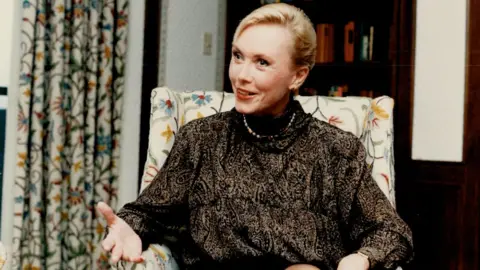 Getty Images
Getty Images“Sex and sexual fantasy are still very much taboo, even though we have shows like Sex Education and Euphoria and Fifty Shades of Grey,” Anderson says. And then there’s “the multi-billion dollar porn industry,” which she describes as being “in our faces, on our screens, on our phones all the time”.
One of the contributions in Want begins: “I found it so difficult to understand what truly my own fantasies are. So much of what is played out in porn is geared towards men, and so many expectations set on us as women, that I have a very difficult time navigating what really turns me on versus how I feel I should perform.”
Anderson would encourage young people to read her book “because there are so many different versions of how sex can be that is outside what is handed to them by the porn industry”.
“There’s a lot of tenderness and women really wanting to be seen for themselves and who they are and be cared for – and there’s a lot of romance in it as well.”
Prof Young highlights a difference between male and female desire. “Women’s fantasies often include an emotional or narrative context that is likely to differ from the more visual, and sexually explicit content reported by men.”
Porn is “typically less attractive to women as pornography is typically generated and focused on men’s desires”, she adds.
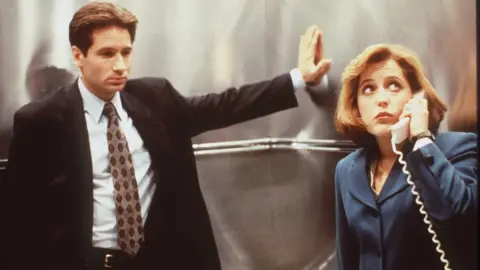 Getty Images
Getty ImagesIn 1973, My Secret Garden contained explicit chapters about fantasies of non-consensual and illegal sex, including a chapter of rape fantasies.
We live in more sensitive times and in 2024, Anderson wanted to create “a safe space for women to share and for women to read and not feel like they have to be wary or afraid of what they’re going to find from one page to the next”.
It was “the right call” to refuse “letters that bordered on illegality or bestiality or incest”, she says.
Despite that choice, a short chapter The Captive contains material Anderson says strays into “dangerous topics and it almost felt disingenuous for us not to include them because they are fantasies that women have”.
Prof Young says these types of fantasy “about intense domination, submission, violent and/or even non-consensual acts are not intended to be acted upon”.
“They provide a safe place to explore interests and desires that are considered taboo, dangerous or socially unacceptable.”
Crucially, for Anderson, in fantasy the woman “is in charge, she can decide with whom, when, where, how much, how often, when to stop, when to continue”.
“So it feels like an empowering admission and revelation rather than something that is under somebody else’s control.”
The 56-year-old star, very much in her prime, recalls “a fair few” of the characters she has played have taught her about sex and sexuality. It’s “vital” for her to understand the inner lives, desires and fantasies of these women, in order to understand “what makes them tick”.
We don’t have time to get into what that meant for her preparation for roles including Miss Havisham in Great Expectations or Emily Maitlis in Emmy-nominated Scoop, a dramatisation of Newsnight’s car-crash interview with Prince Andrew.
But she tells me firmly, when it came to her role in The Crown, she “did not think about Margaret Thatcher’s sexual fantasies”.
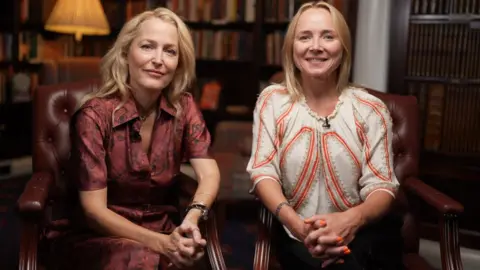
In person, Anderson is every inch the star; glowing, smooth-skinned, petite. Some of the anonymous women in her book struggle with body image and don’t feel desirable.
Even Anderson admits to having “gone through periods where it’s struck me quite harshly that I too am ageing”.
She continues: “Being on camera, there are certainly times… when I’m seeing the final product and thinking, ‘Oh my God, is that really what I look like?’”
Her philosophy is to remember “that’s going to be the youngest that I look from here on out, so I better embrace it”.
Some of her peers resort to plastic surgery. “I haven’t reached for that yet,” she notes. “But at some point, who knows?”
She’s recently finished shooting a female-led period western for Netflix called The Abandons. Anderson plays a silver baron, one of a pair of “duelling matriarchs” opposite Game of Thrones’ Lena Headey.
“I own the town… This is my town. I say that a lot as I’m walking down the middle of the town,” she smiles.
When we met, Anderson sounded British, but often, in interviews and on her Instagram feed, her accent is American.
She was born in the US but has lived permanently in Britain for decades.
“My cells are American, but my soul is British,” she tells me.
Her next role is a Channel 4 drama that she’s about to start filming in Belfast. Her Northern Irish accent is also “not bad, actually”, she says.
But before that, there’s a round of book publicity to get through. And the obvious question, asked not just by me I assume: can she offer up any clues which fantasy is hers?
“No way,” she laughs. Like the others “mine will stay anonymous”.



Be the first to comment